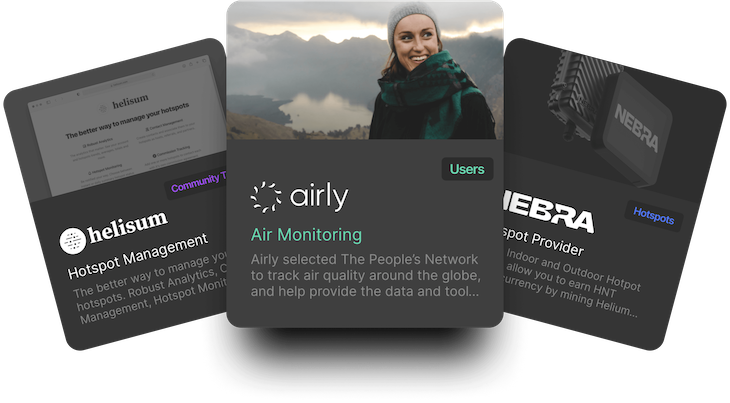Provide Wireless Connectivity and Mine Helium Tokens
Mining Helium tokens (IOT and MOBILE) is done by installing a simple device on your home or office window. That's it. Seriously.
Hotspots provide miles of wireless network coverage for millions of devices across two wireless standards (LoRaWAN and cellular), and you are rewarded in Helium tokens for doing this. LoRaWAN Hotspots are incredibly energy efficient using only 5W of energy.
A World of Hotspots
Since the Helium community approved HIP 19, dozens of Third-party Manufacturers and Vendors are producing and supplying Hotspots that mine Helium tokens for providing wireless connectivity.
Below are the Hotspot models that have so far been approved by the Manufacturing Compliance Committee, which governs Hotspot onboarding. Please do your own research as a vendor listing does not equal endorsement or recommendation.

How do I earn Helium Tokens?
Participants earn Helium tokens by mining and building coverage for The People's Network using compatible Hotspots.
The Value of HNT
Millions of compatible devices can use The People's Network and each device requires Data Credits (DC) in order to send data to the Internet.
Fixed in value, DC are created by 'burning' HNT, reducing the total supply to achieve a Burn and Mint Equilibrium. The more devices using DC, the more HNT will be burned.

How are Tokens Earned?
Hotspots earn Helium tokens for building and securing network infrastructure and transferring device data.
The amount of tokens distributed to Hotspots depends on the type of “work” they perform based on the value to the network. This validation of network contribution is accomplished by a new work algorithm called Proof-of-Coverage (PoC).
PoC was designed to bootstrap Helium Network coverage. Over time rewards will shift to be more heavily allocated to data transfer with less going to PoC as the Network matures.




